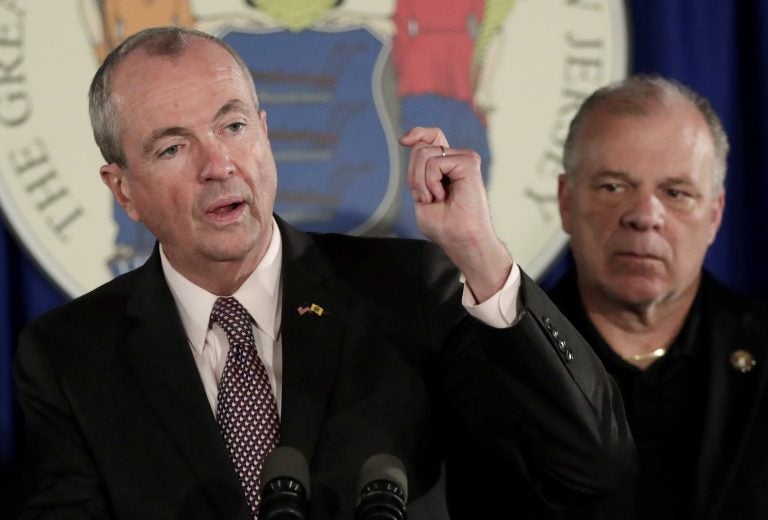Murphy-Sweeney feud could lead to laws shining more light on dark money
As an issue-advocacy group tied to Murphy goes back on its promise to disclose donors, Sweeney fast-tracks legislation that has been sidelined for years.

In this June 30, 2018, file photo, New Jersey Gov. Phil Murphy, (left), discusses his state budget deal with Democratic legislative leaders, as state Senate President Stephen Sweeney, (right), listens during a news conference in Trenton, N.J. (Julio Cortez/AP Photo, File)
The continuing feud between New Jersey’s two most powerful Democrats could lead to the state finally enacting contribution-disclosure laws for dark-money groups that New Jersey’s campaign watchdog and good government activists have been seeking for years.
Sen. President Steve Sweeney (D-Gloucester) on Wednesday announced his support for legislation that would make several changes to campaign finance laws, including a requirement that issue-advocacy 501(c)4 and 527 organizations disclose their donors. These are organizations that advertise and actively support or work against candidates or public ballot questions. Sweeney also wants to further strengthen the measure to include legislation or regulations and make the disclosure rules retroactive to January 1, 2018. Currently, these organizations need not disclose their sources of funds as long as they do not spend more than half their money on election-related communications.
The bill (S-1500) has been pending for almost three years without even a hearing. It has been on the New Jersey Election Law Enforcement’s wish list for longer. But within the past week, an issue-advocacy group with ties to Gov. Phil Murphy has gone back on its word and decided not to voluntarily disclose its donors, as it had promised. The group, New Direction New Jersey, was formed near the beginning of last year and has run two ad campaigns featuring the governor, to the chagrin of some Democratic lawmakers.
Sweeney: Turn down the dark
While Sweeney did not tie his sudden support for disclosure by dark-money groups to the flap about New Direction, the timing of his announcement and the continuing tensions between him and Murphy say it all.
“We need to bring greater transparency and accountability to the organizations that work to influence the actions of government that have an impact on the lives of the people of New Jersey,” is what Sweeney did say in his statement. “If they are attempting to advocate for favored policies, influence the fate of legislation or direct state regulations, the public has a right to know. Full disclosure will improve the process of government and enhance public confidence.”
Sweeney was annoyed about New Direction’s first ad, which ran this past June during negotiations over the state budget. The latest ad, which began running last month shortly after Assembly Speaker Craig Coughlin (D-Middlesex) introduced a bill raising the minimum wage to $15 over five-and-a-half years for most workers, ends with Murphy calling for a higher minimum wage and saying, “families shouldn’t have to wait for bigger paychecks.”
Norcross in the spotlight
Murphy allies said that requiring disclosure of dark money would also impact groups that have supported Sweeney in the past, most notably General Growth Fund, a 501(c)4 with ties to Sweeney ally and South Jersey political boss George Norcross. Politico New Jersey reported earlier this week that Public Service Enterprise Group gave $55,000 to the General Majority PAC, which is allied with General Growth Fund in location and leadership, shortly after lawmakers approved and Murphy signed a Sweeney bill giving the utility up to $300 million in annual subsidies for its nuclear plants. It had meant to give the money to General Growth Fund. Contributions to the PAC must be reported, while those to the fund do not.
Essex County Freeholder Board President Brendan Gill, who managed Murphy’s campaign and was one of the founders of New Direction, was quoted as saying in late 2017 that the group would disclose its donors, even though not required by law to do so. Two previous groups tied to Murphy, New Start New Jersey and New Way for New Jersey, both voluntarily filed disclosures with NJELEC.
But the current political climate and rancor within the Democratic party, which Democratic spokesman Phil Swibinski described as “attacks the organization has sustained from special-interest groups in the state,” have prompted a change of heart.
Murphy: No leverage over dark-money group
Murphy said he supports broadening disclosure requirements to dark-money groups and called on New Direction to disclose its contributors, but said he has no control over that organization and could not force it to do so. Neverthless, he acknowledged on Wednesday that he has helped raise money for New Direction, which is allowed under law. Murphy can bring money into the organization but cannot direct how that money is spent.
Greater disclosure of contributions to politically active social welfare organizations is a hallmark of the first major proposal of the new Democratic majority in Congress. Called the For the People Act, or HR 1, the bill also would make sweeping changes in voting and election laws, require that congressional redistricting be done by independent commissions in each state, and impose new ethics requirements on House members, the Supreme Court, and presidents.
On Wednesday, Murphy acknowledged Sweeney’s support for disclosure legislation and said that may lead it to becoming law.
“I was happy to see the Senate president come to the same conclusion today that (I have). I hope organizations like that disclose their donors,” Murphy said. “I stand for and I’m supporting laws that make sure that happens … I look forward to working with the Legislature to achieve that.”
Responding to scandal
Ben Dworkin, director of the Rowan Institute for Public Policy & Citizenship, noted that New Jersey’s campaign finance laws have typically been toughened as a result of a scandal or public outcry.
“That’s the exact history of campaign-finance reform in New Jersey: scandal, followed by legislation to reform, followed by everyone who plays the game figuring out how to get around the rules, followed by new scandal,” Dworkin said. “The failure by New Direction not to reveal its donors is not a scandal per se; it’s a broken promise by a non-elected group of people.”
Yet it could lead to the first significant change in the state’s campaign finance laws in more than a decade. And Sweeney indicated the measure, co-sponsored by Sen. Troy Singleton (D-Burlington), could advance quickly through the upper house.
“I have reviewed Sen. Singleton’s proposed legislation and I have also reviewed Gov. Murphy’s similar call for more disclosure and transparency,” Sweeney said on Wednesday. “While there have been areas of disagreement between the governor and me of late, this is one area where we agree. I am going to move Sen. Singleton’s bill and propose that it be strengthened to cover all contributions retroactive to January 1, 2018 and expand it to include the advocacy or opposition to proposed or existing legislation and proposed or existing regulations.”
Singleton’s bill to revise “The New Jersey Campaign Contributions and Expenditures Reporting Act” would impose the new disclosure requirements on any dark-money organization that raises or spends $3,000 or more for election-related purposes. It would also require information on each contribution and expenditure in excess of $300. And it would increase campaign contribution limits and lift a ban on intraparty fund transfers during the first half of the year. These are all reforms sought by the NJELEC.
Swibinski said that New Direction is following current law and would follow whatever reforms may be enacted, including the disclosure of its donors.
Dworkin said such disclosures would likely show much of what Trenton insiders suspect about who is contributing to which groups, but it would also give the public information it wants.
“The point about disclosure is if everybody does it, it’s not nearly so bad,” he said.
WHYY is your source for fact-based, in-depth journalism and information. As a nonprofit organization, we rely on financial support from readers like you. Please give today.




